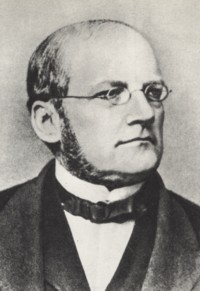
Stanisław Moniuszko (1819-1872) Born on 5th May 1819 in Ubiel near Minsk, learned first at home with his mother Elżbieta. Then, from 1827, he learned the piano with August Freyer in Warsaw, and from 1830 – with Dominik Stefanowicz in Minsk. In 1836, during a stay in Vilnius, he met his future wife - Aleksandra Müller. In 1837 he started studying in Berlin, where he took private lessons in harmony, counterpoint, instrumentation and conducting with Carl Friedrich Rungenhagen, director of “Singakademie” Music Society. In Berlin, he also trained as choir master and accompanist for singers, he became acquainted with the great operatic, large-scale vocal-instrumental and symphonic repertoire, with the process of staging works and with conducting technique, taking part in rehearsals conducted by Rungenhagen and Gaspar Spontini (then a guest in Berlin).After a three-year stay in Berlin, Moniuszko returned to his homeland in 1840. Having got married to Aleksandra Müller, he took residence in Vilnius, where he was a private piano tutor and organist in St John’s church. His activity contributed greatly to the revival of musical life in Vilnius. In St John’s Church, he organised an amateur choir, which performed only for several months, but with which, together with a provisional orchestra, he gave performances of Wolfgang Amadeus Mozart’s Requiem as well as excerpts from the oratorios The Creation by Joseph Haydn and St Paul by Felix Mendelssohn. During one concert, an orchestra conducted by Moniuszko performed works by Gaspar Spontini, Felix Mendelssohn-Bartholdy and Ludwig van Beethoven. The composer also made artistic tours to Petersburg, presenting his works to the audience in this city with much success and favourable reviews. During his journeys, he made friends with major Russian musicians, such as Mikhail Glinka, Alexander Dargomizhsky, César Cui, and Alexander Serov. In 1848 in Vilnius, he staged and conducted the first performance of the first, two-act version of his opera Halka. In 1854, aided by Achilles Bonoldi, he founded the St Cecilia Society, whose amateur members gave public concerts twice a year under the composer’s baton. After the triumph of his new four-act version of Halka during the Warsaw premiere on 1st January 1858, he toured Germany and France, and on 1st August 1858 he was appointed principal conductor of the Polish Opera in the Grand Theatre in Warsaw. The first spectacle to be produced by Moniuszko in the Grand Theatre, still in 1858, was his own one-act opera Raftsmen [Flis]. During his 15 years of work in that theatre he staged all his later operas. With a few exceptions (like Daniel François Esprit Auber’s operas Haydée and Koń spiżowy ) he conducted almost exclusively his own operas. He also occasionally directed choirs in Warsaw’s churches, e.g. presenting Felix Mendelssohn’s oratorio Elijah in the evangelical church). As a conductor, he gave annual composer concerts. In 1862 he visited Paris again hoping to stage one of his operas there, but his efforts failed. The January Uprising in Poland was a period of political turmoil unfavourable to artistic activity and Moniuszko’s work was also affected. In 1865, however, a staging of his Haunted Mansion enjoyed an enthusiastic reception, and his new opera proved to be a success comparable to that of Halka. Already in 1864, Moniuszko started lecturing in harmony, counterpoint and composition in the Music Institute in Warsaw, where he also directed a choir. His disciples included, among others, Zygmunt Noskowski and Henryk Jarecki. Moniuszko’s music was widely acclaimed in Poland and generally accepted as a paragon of “Slavonic” music. After Stanisław Moniuszko’s sudden death of a heart attack on 4th June 1872 in Warszawa, his funeral in the Powązki Cemetery in Warsaw turned into a national manifestation. COMPOSITIONS
A Night in the Apennines, an operetta in 1 act (1837-39) and:
|
|
|

|